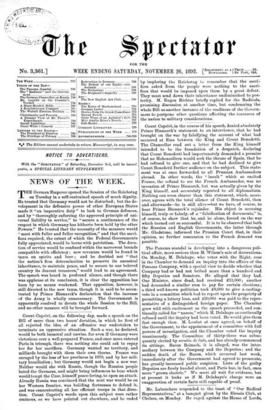Count Caprivi, on the following day, made a speech on
the Bill of more than two hours' duration, in which he first of all rejected the idea of an offensive war undertaken to terminate an oppressive situation. Such a war, he declared, would be both immoral and unwise, for even if Germany were victorious over a well-prepared France, and once more entered Paris in triumph, there was nothing she could ask to repay her for her sacrifices. Germany wanted no territory, and milliards brought with them their own thorns. France was enraged by the loss of her provinces in 1870, and by her mili- tary humiliation ; but Germany would not begin a new war. Neither would she with Russia, though the Russian people hated the Germans, and might bring influences to bear which would tempt the Czar, himself peace-loving, to open an attack. Already Russia was convinced that the next war would be on her Western frontier, was building fortresses to defend it, and was concentrating all her efficient troops in that direc- tion. Count Caprivi's words upon this subject were rather ominous, as we have pointed out elsewhere, and he ended
by imploring the Reichstag to remember that the sacri- fices asked from the people were nothing to the sacri- fices that would be imposed upon them by a great defeat. They must send down their inheritance undiminished to pos- terity. M. Eugen Richter briefly replied for the Radicals, promising discussion at another time, but condemning the whole Bill as another instance of the readiness of the Govern- ment to postpone other questions affecting the resources of the nation to military considerations.






































